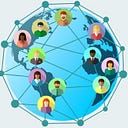How we will solve the world’s hard problems
A new decade has begun to unfold. I feel a combined sense of both the conventional optimism of new beginnings and some trepidation about what feels like a turning point on every level, from the very personal to the global. In the face of unknowns and uncertainty — as well as vast potential — I choose to ground myself in purpose as a means to align my energy and delineate a sense of direction. At Collective Mind, we are doing the same as a team. We’re answering the most important questions: what do we want to accomplish and why does it matter?
Humans have a unique capacity to cooperate. We connect to people with whom we identify. And, based on those connections, we define shared goals and work towards them, combining our resources, knowledge, and efforts. Cooperation is how we solve problems. The human capacity to manage large-scale, flexible cooperation has, according to Yuval Noah Harari, author of Sapiens, “made us masters of the world”.[1]
That doesn’t mean cooperation is easy — problems can be very hard to solve. This is particularly true when the problems are messy and unpredictable, characterized by vast unknowns and lack of clarity about cause and effect. How do we get more women into tech? How do we provide adequate and appropriate responses to humanitarian crises? How do we ensure inclusive economic growth? How do we reduce the vitriol coursing through our political systems? How do we address climate change?
If cooperation is how we solve problems, the harder the problem is to solve, the more we need to cooperate to solve it — and the more effective our models for organizing ourselves have to be. These organizing models must be premised on the things that foster cooperation — connection and shared purpose. We must connect people, bringing them into a collective. And we must foster a shared purpose around which the connected collective can define shared goals and align their efforts.
In the next decade, we will be faced with exceedingly hard problems that will demand new forms of cooperation. At Collective Mind, we believe that networks are a powerful model for organizing people for cooperation. Whatever they are called in practice — networks, coalitions, alliances, partnerships, movements, communities, consortiums, campaigns, forums, initiatives — networks organize collectives around shared purpose for joint action. Through the cooperation that they foster, they create value greater than the sum of the parts.
We strongly believe that the people who build, lead, and manage networks are on the frontlines of solving the world’s hardest problems. Their day job is to connect people and foster shared purpose — and action — amongst them. Our goal is to support those network leaders and builders to be more effective and impactful in their work. By supporting those who foster cooperation, we don’t just help those colleagues — we help to solve all of the problems they seek to solve.
Will you join us?
Kerstin Tebbe
Founder, Collective Mind
kerstin@collectivemindglobal.org
[1] https://www.smithsonianmag.com/arts-culture/what-makes-humans-different-fiction-and-cooperation-180953986/
